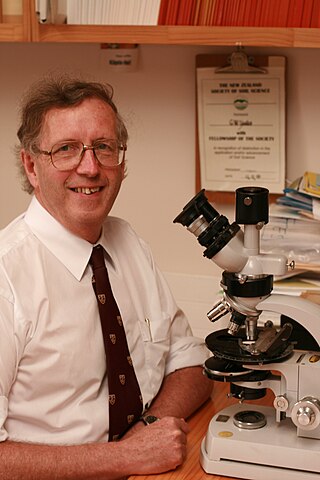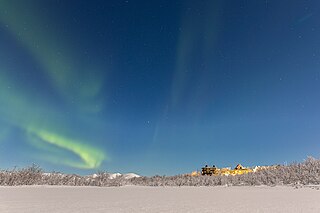Related Research Articles
Simon Asher Levin is an American ecologist and the James S. McDonnell Distinguished University Professor in Ecology and Evolutionary Biology and the director of the Center for BioComplexity at Princeton University. He specializes in using mathematical modeling and empirical studies in the understanding of macroscopic patterns of ecosystems and biological diversities.
Richard J. Hobbs FAA, is a distinguished professor, ARC Australian Laureate Fellow and ecologist at the University of Western Australia, Perth, Australia. He is a fellow of the Australian Academy of Science and a Highly-Cited author who has written extensively in the areas of vegetation dynamics and management, ecosystem fragmentation, ecosystem rehabilitation and restoration, landscape ecology, and conservation biology. Current research focuses on managing ecosystems in a rapidly changing world.
Farooq Azam is a researcher in the field of marine microbiology. He is a Distinguished Professor at the Scripps Institution of Oceanography, at the University of California San Diego. Farooq Azam grew up in Lahore and received his early education in Lahore. He attended University of Punjab, where he received his B.Sc. in chemistry. He later he received his M.Sc. from the same institution. He then went to Czechoslovakia for higher studies. He received his PhD in microbiology from the Czechoslovak Academy of Sciences. After he received his PhD, Farooq Azam moved to California. Azam was the lead author on the paper which coined the term microbial loop. This 1983 paper involved a synthesis between a number of leaders in the (then) young field of microbial ecology, specifically, Azam, Tom Fenchel, J Field, J Gray, L Meyer-Reil and Tron Frede Thingstad.

Browsing is a type of herbivory in which a herbivore feeds on leaves, soft shoots, or fruits of high-growing, generally woody plants such as shrubs. This is contrasted with grazing, usually associated with animals feeding on grass or other lower vegetations. Alternatively, grazers are animals eating mainly grass, and browsers are animals eating mainly non-grasses, which include both woody and herbaceous dicots. In either case, an example of this dichotomy are goats and sheep.
David William Schindler,, was an American/Canadian limnologist. He held the Killam Memorial Chair and was Professor of Ecology in the Department of Biological Sciences at the University of Alberta in Edmonton, Alberta. He was notable for "innovative large-scale experiments" on whole lakes at the Experimental Lakes Area (ELA) which proved that "phosphorus controls the eutrophication in temperate lakes leading to the banning of phosphates in detergents. He was also known for his research on acid rain. In 1989, Schindler moved from the ELA to continue his research at the University of Alberta in Edmonton, with studies into fresh water shortages and the effects of climate disruption on Canada's alpine and northern boreal ecosystems. Schindler's research had earned him numerous national and international awards, including the Gerhard Herzberg Gold Medal, the First Stockholm Water Prize (1991) the Volvo Environment Prize (1998), and the Tyler Prize for Environmental Achievement (2006).

Stephen Russell Carpenter is an American lake ecologist who focuses on lake eutrophication which is the over-enrichment of lake ecosystems leading to toxic blooms of micro-organisms and fish kills.
Bruce A. Menge is an American ocean ecologist. He has spent over forty years studying the processes that drive the dynamics of natural communities. His fields of interest include: structure and dynamics of marine meta-ecosystems, responses of coastal ecosystems to climate change, linking benthic and inner shelf pelagic communities, the relationship between scale and ecosystem dynamics, bottom-up and top-down control of community structure, recruitment dynamics, ecophysiology and sub-organismal mechanisms in environmental stress models, larval transport and connectivity, impact of ocean acidification on marine ecosystems, controls of productivity, population, community, and geographical ecology. He settled on two career goals: carrying out experiment-based field research to investigate the dynamics of rocky intertidal communities, focusing on species interactions and environmental context and how this might shape a community, and using the resulting data to test and modify theories on how communities were organized.

Gregor William Yeates, publishing as GW Yeates, was a New Zealand soil zoologist and ecologist. He was "considered the world's leading authority in soil nematode ecology, a subject of economic and ecological importance."

Climate Impacts Research Centre (CIRC) is a research institute based at the Department of ecology and environmental science (EMG) at Umeå University, Sweden, but primarily operative at Abisko Scientific Research Station which is run by the Swedish Polar Research Secretariat.
Carolyn Mary King is a New Zealand zoologist specialising in mammals, particularly small rodents and mustelids. She is currently a professor of biological sciences at the University of Waikato.
Kevin Russel Tate was a New Zealand soil chemist, ecologist and climate scientist.
Robert Poulin is an evolutionary ecologist specialising in the ecology of parasitism. He is a professor of zoology at the University of Otago and a Fellow of the Royal Society of New Zealand.
Katharine Josephine Mary Dickinson is a New Zealand academic working in the field of botany. In 2009 the New Zealand Ecological Society awarded Dickinson the Te Tohu Taiao Award, an award for ecological excellence. As of 2018 she is a full professor at the University of Otago.
Jacqueline Rae Beggs is a New Zealand entomologist and ecologist specialising in biodiversity and biosecurity.
Nancy B. Grimm is an American ecosystem ecologist and professor at Arizona State University. Grimm's substantial contributions to the understanding of urban and arid ecosystem biogeochemistry are recognized in her numerous awards. Grimm is an elected Fellow of the American Geophysical Union, Ecological Society of America, and the American Association for the Advancement of Science.

Erika Marín-Spiotta is a biogeochemist and ecosystem ecologist. She is currently Professor of Geography at the University of Wisconsin-Madison. She is best-known for her research of the terrestrial carbon cycle and is an advocate for underrepresented groups in the sciences, specifically women.

Shahid Naeem is an ecologist and conservation biologist and is a Lenfest Distinguished professor and chair in the Department of Ecology, Evolution, and Environmental Biology at Columbia University. Naeem is the author of Biodiversity, Ecosystem Functioning, and Human Well-Being, and has published over 100 scientific articles.
Tadashi Fukami is an associate Professor of Biology and community ecologist at Stanford University. He is currently the head of Fukami Lab which is a community ecology research group that focuses on "historical contingency in the assembly of ecological communities." Fukami is an elected Fellow of the Ecological Society of America.

Priscilla M. Wehi is a New Zealand ethnobiologist and conservation biologist. As at July 2021 she is an associate professor at the University of Otago and on the first of that month officially undertook the role of director of Te Pūnaha Matatini, a centre of research excellence in complex systems and data analytics. During the COVID-19 pandemic in New Zealand Te Pūnaha Matatini scientists have developed mathematical models of the spread of the virus across the country that influence the New Zealand government's response to the outbreak. In 2021 Wehi was awarded the Hill Tinsley Medal.

Janet Mary Wilmshurst is a New Zealand palaeoecologist who works on reconstructing the ecological past. Wilmshurst has been a Fellow of the Royal Society Te Apārangi since 2015. She was president of the New Zealand Ecological Society, and currently works as principal scientist in long-term ecology at Manaaki Whenua Landcare Research focusing on recent fossil records to reconstruct and trace past ecosystem changes in response to natural disturbance.
References
- ↑ "Royal Society Te Apārangi – View our Fellows". Royalsociety.org.nz. Retrieved 25 January 2018.
- ↑ "New Zealand Association of Scientists - Awards".
- ↑ "Te Tohu Taiao – Award for Ecological Excellence | NZES". Newzealandecology.org. 30 June 2017. Retrieved 25 January 2018.
- ↑ "Knut och Alice Wallenbergs Stiftelse" (in Swedish). Wallenberg.com. 17 June 2010. Retrieved 25 January 2018.